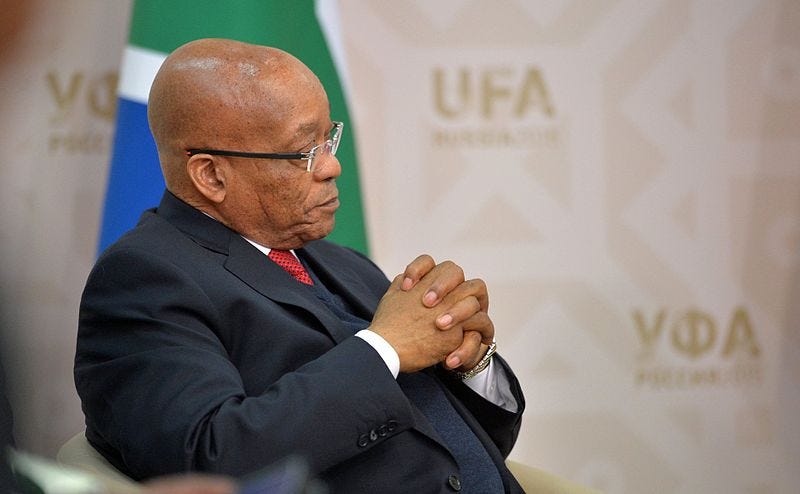🔅 Sudan's Secret Peace Talks & The Cultural Clash Over Uganda's Traditional Music
Plus, Jacob Zuma's ANC Departure and Africa's Debt Dilemma: Rating Agencies Under Fire
Photo of the Day

Brief & Bright: Africa's Top Five
Sudan's Secret Summits: Generals, Gulf States, and Aiming For Peace

Senior officials from the Sudanese army and their frenemies, the Rapid Support Forces (RSF), have been caught having secret rendezvous in Bahrain. This marks their first meeting in months. The gatherings, shrouded in mystery and unannounced to the public, saw the army and the RSF meet, alongside some VIPs from Egypt and the UAE, with the US and Saudi Arabia also sliding into the meetings.
The backdrop is a war that kicked off last April amidst a power struggle between the two, which has resulted in over 13,000 deaths. The RSF has been advancing on the capital while being accused of ethnic cleansing in the Darfur region in the west. The army, on the other hand, has been busy recruiting and arming civilians in the capital. Amidst this chaos, previous peace parleys achieved nothing substantial.
Enter Bahrain, the latest setting for peace talks that actually saw big names from both camps show up. There was even talk of a "declaration of principles" between the two. The world is watching as Sudan's tale of conflict and diplomacy unfolds, although a follow-up meeting scheduled for last week was apparently postponed for unknown reasons.
Zuma's ANC Breakup: When Ex-Presidents Go Rogue
South Africa's ANC (African National Congress) has shown its former head honcho, Jacob Zuma, the door. Why? Because he decided to play for another team in this year's general election. Zuma, whose nine years as president from 2009 was beset by scandals and slow economic growth, has thrown his lot in with the new kid on the block, the uMkhonto we Sizwe (MK) party.
The ANC's statement accused unseen forces of trying to chip away at its base by encouraging "rebel break-away groupings." Meanwhile, Zuma hasn't said a peep about his suspension. The MK party, named after the ANC's old armed wing, is Zuma's way of sticking it to his successor, Cyril Ramaphosa. The current president was at the ANC's helm when Zuma's fall from grace resulted in a 2021 jail stint for snubbing a corruption inquiry, but that sparked deadly protests proving that even out of office, Zuma can still cause a stir.
The Fumbo vs. The Radio: A Cultural Crossroads in Uganda

In the green expanses of Tororo, Uganda, a showdown of tradition versus technology is unfolding. For the Jopadhola people, with their rich traditions nestled 124 miles east of Kampala, traditional burial rites are meant to include the haunting melodies of the fumbo, a drum that's increasingly being sidelined by DJs and their booming sound systems.
Old schoolers such as Ogambo, who is 90, watch this evolution with a mix of amusement and concern. He reminisces about the days when funerals were a deeply interactive affair, with music that made you feel the loss in your bones, unlike the "leisure funerals" of today, where the playlist could easily be mistaken for a club's. It's not just about music itself; it's about memory, history, and identity, with the fumbo and traditional songs weaving the deceased's life into a melody, allowing for a sense of mourning that DJ base drops can't.
Africa's Debt Defaults: How Much Should Rating Agencies Be Blamed?
According to the International Monetary Fund (IMF), more than half of sub-Saharan countries are now either deep in debt distress or flirting dangerously close to it. Gone are the days when African countries were the belle of the global investment ball and getting (relatively) easy-to-service loans.
African politicians have pointed fingers at credit rating agencies, saying they too freely hand out downgrades to their governments, making it more expensive for them to borrow. As a result, the African Union aims to implement its own rating agency to set things right. The United Nations chimed in, claiming that “objective” ratings could have saved a jaw-dropping $75 billion in debt service costs.
But are they right? In this opinion piece in the Financial Times, this economist argues that rating agencies use the same crystal ball for everyone, from Canada to Cameroon, and that they have actually been fairly accurate in their predictions since 2023. What's more, he argues that politicians' criticism against agencies is a red herring. What do you think? We'd love to hear from the economists out there...
Food for Thought
“A flea can trouble a lion much more than a lion can trouble a flea."
— Kenyan Proverb




